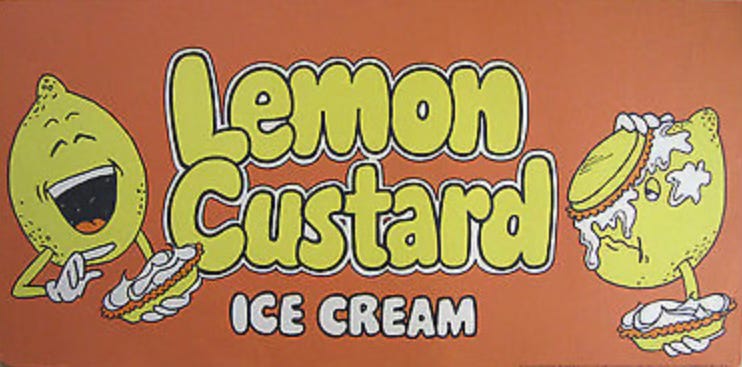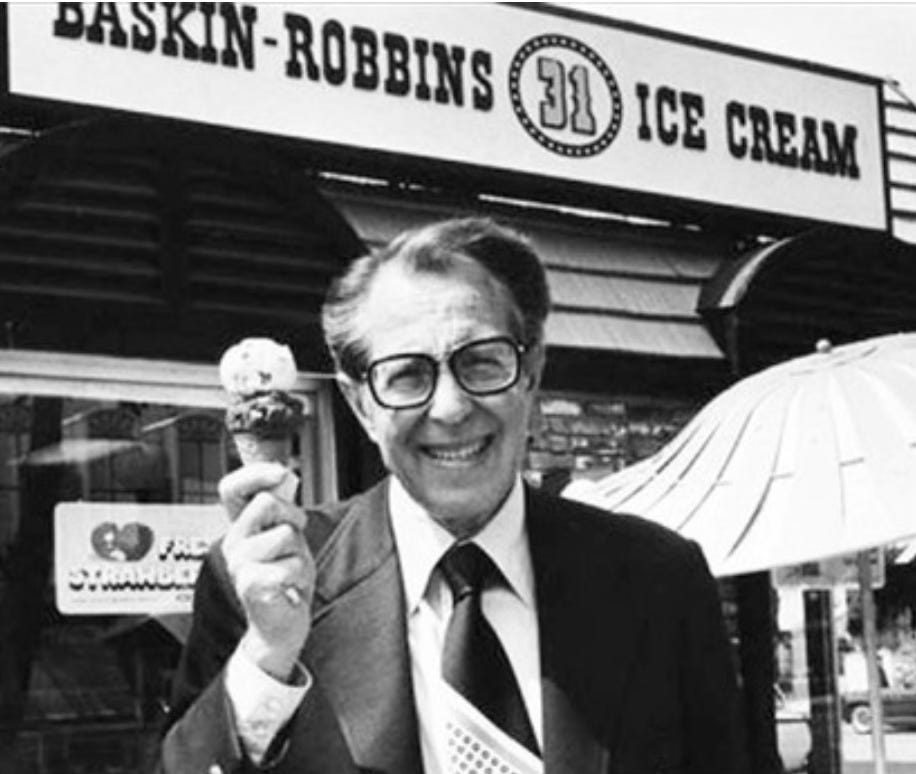Teach the Parents Well
John Robbins, son of the founder of Baskin-Robbins ice cream stores, died June 11. His would not usually be an obituary I’d read, but nostalgia drew me in. Five of my older siblings worked as teens in the local Baskin-Robbins, and the store and its sweet smell and cartoon posters and clean backroom loomed large in my childhood imagination as a magical place.
John Robbins had an interesting life—succinctly summed up in the New York Times obituary subtitle thusly— “He walked away from his family’s hugely successful ice cream business to crusade for a plant-based diet and against cruelty to animals”—but it’s his father Irv Robbins, shown only in glimpses in John’s obituary, who fascinates me. Young Irv worked at his own father’s dairy and ice cream store. In 1945 Irv teamed with his brother-in-law Burt Baskin to open Baskin-Robbins in Glendale, California, eventually growing the business to over 7,500 stores worldwide. Irv loved working—too much, his son would say—and he really loved ice cream. He put ice cream on his breakfast cereal and built an ice-cream shaped swimming pool in the backyard.
Irv brought John into the family business with the expectation that he would take it over one day. When John was twenty, Burt Baskin died suddenly of a heart attack at age 54. Irv offered to partner with his son rather than sell the business, but John declined. “The more I learned about the health implications of ice cream, and the more I learned about how the cows were treated, the less enjoyment I took and the more concerned I felt,” he said.
John turned his life in the opposite direction of his father’s. He became vegan and moved with his wife to a log cabin he built himself in British Columbia. They grew their own food and lived on $1,000 or less a year. Out of his research into the connections between diet, the environment and the ethical treatment of animals, he wrote the 1987 bestseller Diet for a Healthy America.
Irv took his son’s wholesale rejection hard, and the two became estranged. John’s son Ocean Robbins is quoted in the New York Times obituary as saying, “He [Irv] thought he had fallen prey to the hippie counterculture world where you just reject everything.”
I feel for Irv. He was wrong to not accept his son’s choices, but the rift and the repudiation of his life’s work must have been painful.
Now the wonderful part of the story, the father-son reconciliation. In the late 1980’s Irv was overweight and suffering from diabetes and heart disease. His doctor handed him Diet for a Healthy America, not knowing Irv’s son had written it. Father read son’s book, changed his diet, and lived another 20 years. The Robbins re-connected.
I wonder if it made Irv Robbins happy to realize that his son, by pursuing his own career path, may have saved lives. To put it more bluntly, was Irv happy that his son was right and he was wrong?
This surprising realization comes to every parent or parent-figure sooner or later. Show me an older person who hasn’t admitted as much and I’ll show you someone who doesn’t have a very good relationship with the young people in his life.
In my case, the I’m-wrong-they’re-right issue centers around my habit of catastrophizing situations and bracing my kids for the worst. In the name of protection, I’ve tried to prepare them for trouble so that, in the name of happiness, they’ll be relieved when it doesn’t arrive. I have feared disappointment for them more than missed opportunity.
Over the years they’ve gently pointed out how annoying and counterproductive this habit is. I asked them for examples of my over-worrying, over-managing parenting style, and my son answered, “How much time do you have?” Others mentioned the articles and Instagram reels I’ve periodically (cough, cough) sent on disease prevention, the dangers of constipation and black cooking utensils, internet scams to avoid, and what to do if your car goes underwater—even though only one of them drives on a regular basis.
An old story demonstrates this trait best.
One evening when my youngest daughter was getting ready for her first concert, I leaned in the bathroom doorway to watch as she straightened her hair and curled her lashes. I asked questions about logistics and listened to her chatter happily on and on about how excited she was. “This is going to be the best night of my life!” she said.
“Well,” I felt compelled to say, having seen the disappointment many such nights brought her older siblings, “it probably won’t be the best night of your life.”
And thwuup! I sucked the joy right out of that bathroom. To the benefit of nobody.
One more story. A few months ago my husband and I were visiting another daughter. He noticed a small poster on the bathroom door in her apartment that said, “What if it all works out?” He whispered to me, “Why does our daughter need to have a sign in her bathroom telling her things will turn out okay?”
I guess because of me. Watch out for this, Watch out for that, Watch out! My warnings have been another way of saying, It might not turn out. And also: Stick to my script so I don’t have to worry. What a sad foundation to give one’s children!
Whenever I fall back into my old habit, eye-rolls and non-reaction are my kids’ teaching tools. But they have an even better one. Should they confide in me something guaranteed to activate my worst-case-scenario instructions, they’ll add, casually, Don’t worry about it, Mom. It’ll work out. Which is pretty wise of them, given that my message has so often been the opposite.
*
Once More, With Feeling!
Along similar lines of children teaching wisdom to parents, I found a recent interview with the Grody-Patinkin family riveting. [Link is for a YouTube video but you can also listen to it on Apple Podcasts or Spotify.] Mandy Patinkin (Inigo Montoya in Princess Bride, Saul in the TV series Homeland) and his wife actress Kathryn Grody and son Gideon Grody-Patinkin sat down with David Marchese of “The Interview” for a rollicking discussion of their family life, their “messes,” and their new project, an advice podcast following up the wild success of their pandemic-era Instagram account.
It's entertaining, insightful and worth the hour’s time to listen to it. But I have to warn you: these people are emotional. (Mandy and Kathryn, that is, not Gideon.) I don’t think I’ve ever heard a podcast interview with such raw highs and lows of emotion.
For example, near the end of the conversation, following a passionate outburst, Patinkin says, his voice heavy with feeling, “I wish to God I could answer any of your questions without getting so intense. I don't know how to do it. I wish I could.”
In the next breath he’s laughing again. “Let me get out the fire extinguisher,” he says.
Gideon, on the other hand, is calm. He acts like he is the parent and Mandy and Kathryn are out-of-control children.
One moment in the interview brought out this dynamic in a way I especially relate to, although I wish didn’t. Kathryn is talking about how she had to be the rock in their marriage so her husband could be the lunatic. Gideon begs to differ:
Gideon: I've said to you, I said, Mom, I really also want to be good friends with you, but that involves being able to communicate things that aren't positive in my life. It's very difficult to do that with you when you're so ravenous to take your children's problems or anybody else's problems and then blow them up and make them a bigger thing and repeat them to your friends and live in them so that you can avoid your own life. And I think that's something we're working on.
Kathryn: So that's an improvement, right? Sort of.
Gideon: We're getting there.
We’re getting there. Right, kids?
*
Irv Serves
I’ve only touched on Irv Robbins’ life story. Budding entrepreneurs may want to read more. The man was made for business—he was creative, hard-working, and a marketing genius. Among other innovations, he and his wife came up with the postcard idea for a free cone on your birthday and the small pink spoons to encourage people to try unusual flavors.
Here’s how Irv remembers the origin of the famous “31 Flavors” logo (from HistoryLink, an online encyclopedia of Washington state history):
"As a kid, I was in Chicago at the World’s Fair in 1933, and like every able-bodied young man, I had to go to a burlesque," Robbins recalled. "I went to Minsky’s Burlesque, where I saw a sign that said, '21 Girls 21,' so that gave me the idea for making a sign of '21 Flavors 21.’”
Later they would up the number of flavors to 31, one for every day of the month.
*
If you enjoyed this issue of Restless Egg, please share with someone else who might enjoy it too! I love to get new subscribers.







Maggie, I admire your bravery in pulling back veils one would rather not see behind. Everything can be a lesson if I am willing to see the unadorned truth of it. I’m taking baby steps toward embracing ever more difficult self-revelations and gaining freedom with every step. You heal me keep my resolve.